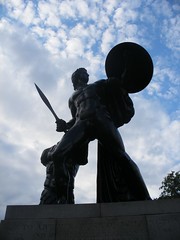June 05, 2009
Nasty, brutish and short
 A new Science paper, Did Warfare Among Ancestral Hunter-Gatherers Affect the Evolution of Human Social Behaviors? -- Bowles 324 (5932): 1293 -- Science (Wired has a story), tries to estimate how strong the selection pressure for altruism was in the late Pleistocene and early Holocene. Be as it may with the model (which is interesting on its own), but the estimated frequency of conflict is pretty shocking. The fraction of total morality due to warfare is around 12-14%.
A new Science paper, Did Warfare Among Ancestral Hunter-Gatherers Affect the Evolution of Human Social Behaviors? -- Bowles 324 (5932): 1293 -- Science (Wired has a story), tries to estimate how strong the selection pressure for altruism was in the late Pleistocene and early Holocene. Be as it may with the model (which is interesting on its own), but the estimated frequency of conflict is pretty shocking. The fraction of total morality due to warfare is around 12-14%.
Anybody who claims hunter-gatherer lifestyle is optimal for humans should consider this number. The current worldwide frequency of violent deaths is 1.28%. Modern hunter-gatherer societies tend to be pretty violent too, but there could be confounding effects. There might of course have been entirely peaceful tribes, but most of the archaeological evidence looks pretty violent. As noted in the paper, the late Pleistocene climate volatility would have caused periodic resource scarcities and likely intergroup conflicts - even the hypothetical peaceful tribes would have risked coming into contact with a warlike tribe during such times.
The paper's point is pretty simple: in-group altruism can be pretty costly, so there has to be a sufficiently strong evolutionary pressure to keep it going (since the genes of the self-sacrificing hero have to spread using his less heroic family members). The tribal warfare helped fix altruism in us.
Maybe one reason we humans do have so much cooperation is this long era of nasty Malthusian living. If we had been living in a world where group-group violence had been impossible, there would likely have been less selection for in-group altruism. We would have been sneakier people, more likely to seize advantage over our fellows/competitors whenever opportunity presented itself. Maybe we would even have had goatees.